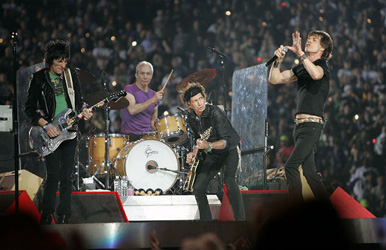I was in the supermarket yesterday evening and indulged myself by browsing at the magazine section. There, on the front of the NME, I noticed the news that the Rolling Stones have announced some live dates. Investigating further, there are two shows at the O2 arena next month, although there were no details of prices.
Once home, I took a look online to investigate. At present, they are not available to the general public, unless you want to buy a box set vinyl triple album with your ticket for something like £600 odd all in. Ouch. Oh and American Express cardholders can pre-book. No idea if this extends to O2 phone contract holders as is often the case at shows at this venue. Anyway, I don’t care. Looking at the ticket prices (without the vinyl box set), the cheapest is over £100 and the closer you get to the stage, the closer it creeps up to the four figure mark.
I was interested to see some feedback to the prices on one of the official ticketing sites. Anyway I digress, because the point is, with the decision to re-band the prices of tickets in the stadium, Arsenal are heading this way. Ivan Gazidis makes a great play of the idea that the new price structure was reached after extensive consultation with supporters groups last season – including AISA and the Arsenal Supporters’ Trust. However, while the introduction of Grade C matches with cheaper pricing certainly came out of pressure from those that the club spoke with, the rise in prices for Grade A games did not. So there’s a half truth in Gazidis’ words, but his statement is somewhat selective to say the least. The man is wasted as a CEO of a football club, as the snakepit of politics is surely his natural home.
The club are well aware that the vast majority of their glamour games will sell out (last season’s Grade A matches were Spurs, Man Utd, Man City, Liverpool, Chelsea and Milan) and are resistant to price increases. So I can see these rising as long as they continue to sell out, as indeed Rolling Stones ticket prices have over the years. The Grade C prices – lower than have ever been charged at the new stadium - are a sop to the voices of protest, although it just so happens that these are the matches the club struggle to sell out. So prices are adjusted according to supply and demands, as they are by ticket touts.
Ultimately, making money – and increasing the club’s cash reserves for reasons unknown, appear to be the dominant ethos at Arsenal these days (as opposed to concentrating mainly on sporting success while keeping an eye on the bank balance to ensure unmanageable debt is avoided), with an economist as a football manager and a disinterested (in the sport) owner who attends a game or two each season as the most influential policy makers. The likes of Ivan Gazidis are ultimately doing their bidding, but please don’t insult our intelligence by telling us that the most expensive tickets in English football (up to £123.50 for a Grade A game in the ordinary seats) are a consequence of consultation with the fan groups.







